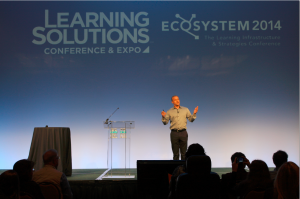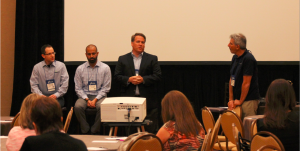What I Learned at Ecosystem 2014 – JD Dillon
The first Ecosystem Conference took place in March of this year in Orlando alongside the annual Learning Solutions Conference and Expo. We’re happy to welcome a member of the Guild Community, JD Dillon from Kaplan Higher Education Group, as a guest writer for this TWIST post as he shares his takeaways from this year’s event.
 “Ecosystem 2014 is designed for those looking for answers to questions about learning and knowledge management systems, social, informal, and mobile platforms, and related technologies, and how individual components of an organization’s learning infrastructure can be combined and balanced to create a customized learning ecosystem that delivers training and support, drives learner engagement, leverages collaboration, and tracks performance across their organization …”
“Ecosystem 2014 is designed for those looking for answers to questions about learning and knowledge management systems, social, informal, and mobile platforms, and related technologies, and how individual components of an organization’s learning infrastructure can be combined and balanced to create a customized learning ecosystem that delivers training and support, drives learner engagement, leverages collaboration, and tracks performance across their organization …”
That quote is from the ‘Who Should Attend’ page on the Ecosystem 2014 website. Billed of the ‘Learning Infrastructure and Strategies Conference,’ Ecosystem was a very new L&D experience for me and probably most other attendees. Simply stated, this wasn’t the traditional ‘show me what you do so I can do it too’ industry event. It was thought-provoking, confusing, engaging, uncomfortable, and (most importantly) long-overdue. Here are a few of my takeaways from Ecosystem 2014.
It’s what?
I didn’t have much luck explaining the purpose of the conference to my peers at work before I attended. I usually went with “It’s more about the BIG picture of how we use our resources to create a system of learning and performance support” to which I’d get an “ooooooooooh.” I still don’t think they get it, and I think this is a strong indicator of where our industry is right now. When we try to expand the discussion beyond specific modalities or technologies, it gets a bit muddy. People seem to most like talking about the 5 major trends that dominate L&D event schedules nowadays (social, mobile, gamification, measurement, MOOCs). Ecosystem and it’s organizers from the eLearning Guild dared to step beyond the ‘comfortable’ industry conference topics and create an organized attempt to think about that BIG picture of how all of our efforts are impacting our organizations’ cultures.
 A Focus on Questions
A Focus on Questions
I walked away from Ecosystem 2014 with more questions than answers, and I LOVE it! Almost all of the L&D events I attend (conferences, webinars, communities of practice, etc.) take the posture of “this is how you should be doing X because that’s how we are doing it and it’s working out pretty well.” A few even include “here’s the solid research on which our theories are based,” which is always nice. Ecosystem didn’t do that … on purpose. Every session I attended was led by folks with years of experience in learning and development. However, none of them had *the* answer as to how to create the best learning and performance ecosystem. Heck, many couldn’t even concretely define what an ‘ecosystem’ is within an organization. This uncertainty and the conversation that it created was my absolute favorite part of the conference!
Rather than be handed models for success, I listened to respected professionals like Clark Quinn, Lance Dublin, and other as they shared their new ideas (many based on others’ research) around how we can approach the workplace ecosystem and use our expanding tools and methodologies to improve performance. This allowed participants to challenge the presenters (crazy, right) and help create even better ideas and actionable takeaways. What I believe to be the most insightful observation of the event came from Mark Britz, with whom I was lucky enough to sit on a panel discussion along with Bob Mosher. Mark explained that we don’t have to create learning and performance ecosystems in our organizations because they are already present. It’s our job as professionals to assess the health of these systems and support our people with tools and processes that allow them to build and sustain their own ecosystems. Deep, right? In my opinion, this statement summed up the entire point of the conference and opened participants minds to entirely new questions about what we do for a living.
Technology is a means, not the end
A common thread throughout Ecosystem sessions was that learning technology is just one way we can improve our performance environments. Rather than focusing only on the tech, most discussions were centered around the needs of the people L&D supports. Technology was then positioned as a way to personalize and scale good ideas. This was a welcomed departure from sessions focused on providing examples of how specific tools and strategies will improve your results.
Panel Discussions: My New Favorite Conference Session Type
 My favorite Ecosystem sessions were all panels. I don’t recall being overly fond of panel discussions at past events, as they were usually disorganized and simply gave organizational leaders a chance to brag about their achievements. At Ecosystem, the panels were effectively moderated and allowed presenters to bring concepts to life through practical examples. The intimate size of the conference also permitted more effective question/answer and resulting discussion than a larger event.
My favorite Ecosystem sessions were all panels. I don’t recall being overly fond of panel discussions at past events, as they were usually disorganized and simply gave organizational leaders a chance to brag about their achievements. At Ecosystem, the panels were effectively moderated and allowed presenters to bring concepts to life through practical examples. The intimate size of the conference also permitted more effective question/answer and resulting discussion than a larger event.
Co-location is a Great Idea
The fact that this event is formed around a challenging concept that requires considerable participant engagement and in-depth conversation within each session means that it’s best suited for a small venue with a limited number of people per session. With those logistical considerations, you’re likely to lose the bigger/badder conference offerings and/or see the registration price skyrocket. Co-locating this event with Learning Solutions 2014 allowed Ecosystem participants to experience the best of both worlds. In addition to the intimate session discussions and panel offerings, we had the option to visit the Learning Solutions expo, constant learning stage presentations, three formidable keynotes, SolutionFest, and after-hours activities like Game Crawl and (my personal favorite) #lrnchat LIVE!.
Continuing this Conversation
Yes, Ecosystem 214 was targeted at senior leaders within learning and development organizations. I still feel the questions asked at Ecosystem require a considerable amount of thought and application before a participant can effectively engage in meaningful discussion. For that reason, I’d like to see the ‘ecosystem discussion’ integrated into other events, especially those that target specific strategies and modalities (for example, mLearnCon, Performance Support Symposium, Online Forums, etc.). This may give practitioners in various roles the proper exposure to and experience with the idea of an ‘ecosystem’ to make the conference experience that much more meaningful. Rather than the beginning of the conversation, Ecosystem can be positioned as a strategic stop along the path towards big picture improvement.
I’ll be there next year!
Ecosystem 2014 provided me with the conference experience that I’ve been wanting for the past several years – a structured opportunity to explore the bigger picture of how we support performance improvement within our organizations. For that reason, I am excited to see how the discussion continues into future events, and I will definitely be reserving time on my calendar to attend (and hopefully speak) at Ecosystem 2015.

Leave a Reply